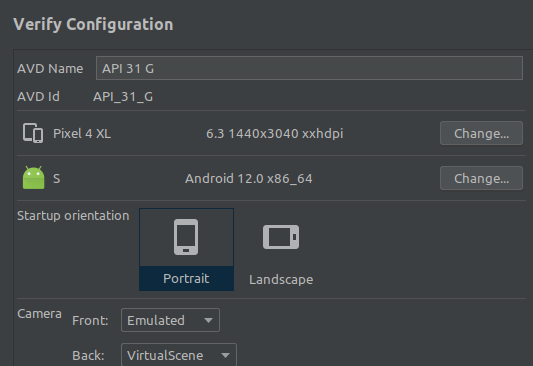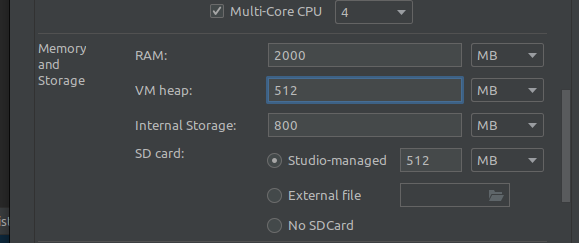Android Emulator Performance is Extremely Unstable
2
votes
1
answer
1235
views
First of all, hopefully this is the right place to post this type of question - if it isn't, do let me know.
I have a relatively new PC with 16 GB RAM, 10th Gen Core i3, 4 physical and 4 virtual cores (hyperthreading), I do not have an SSD. It runs Linux Mint and uses the KVM.
The first year or so after buying my computer, the emulator worked great - it was fast and I was having a great time working on my apps.
A couple of weeks ago, I realized that the emulator would occassionally become slower (around 50-60 percent, to be exact) for around a minute or two, before then becoming very fast for around 1-3 minutes.
It's very strange, it goes like so:
- Boot up emulator
- Starts off blazingly fast
- 2 minutes later it suddenly drops by around 50-60 percent in speed for around 1-2 minutes
- Becomes blazingly fast again for some time
Here is my emulator configuration stats:

 (I sometimes use AOSP emulators, but in this case I will just give an example of the Google API emulator.)
This is incredibly frustrating - I use the emulator so many times, and I have a relatively new PC.
PC info:
(I sometimes use AOSP emulators, but in this case I will just give an example of the Google API emulator.)
This is incredibly frustrating - I use the emulator so many times, and I have a relatively new PC.
PC info:

 (I sometimes use AOSP emulators, but in this case I will just give an example of the Google API emulator.)
This is incredibly frustrating - I use the emulator so many times, and I have a relatively new PC.
PC info:
(I sometimes use AOSP emulators, but in this case I will just give an example of the Google API emulator.)
This is incredibly frustrating - I use the emulator so many times, and I have a relatively new PC.
PC info:
Architecture: x86_64
CPU op-mode(s): 32-bit, 64-bit
Address sizes: 39 bits physical, 48 bits virtual
Byte Order: Little Endian
CPU(s): 8
On-line CPU(s) list: 0-7
Vendor ID: GenuineIntel
Model name: Intel(R) Core(TM) i3-10105 CPU @ 3.70GHz
CPU family: 6
Model: 165
Thread(s) per core: 2
Core(s) per socket: 4
Socket(s): 1
Stepping: 3
CPU max MHz: 4400.0000
CPU min MHz: 800.0000
BogoMIPS: 7399.70
Flags: fpu vme de pse tsc msr pae mce cx8 apic sep mtrr pge mc
a cmov pat pse36 clflush dts acpi mmx fxsr sse sse2 ss
ht tm pbe syscall nx pdpe1gb rdtscp lm constant_tsc art
arch_perfmon pebs bts rep_good nopl xtopology nonstop_
tsc cpuid aperfmperf pni pclmulqdq dtes64 monitor ds_cp
l vmx est tm2 ssse3 sdbg fma cx16 xtpr pdcm pcid sse4_1
sse4_2 x2apic movbe popcnt tsc_deadline_timer aes xsav
e avx f16c rdrand lahf_lm abm 3dnowprefetch cpuid_fault
epb invpcid_single ssbd ibrs ibpb stibp ibrs_enhanced
tpr_shadow vnmi flexpriority ept vpid ept_ad fsgsbase t
sc_adjust bmi1 avx2 smep bmi2 erms invpcid mpx rdseed a
dx smap clflushopt intel_pt xsaveopt xsavec xgetbv1 xsa
ves dtherm ida arat pln pts hwp hwp_notify hwp_act_wind
ow hwp_epp md_clear flush_l1d arch_capabilities
Virtualization features:
Virtualization: VT-x
Caches (sum of all):
L1d: 128 KiB (4 instances)
L1i: 128 KiB (4 instances)
L2: 1 MiB (4 instances)
L3: 6 MiB (1 instance)
NUMA:
NUMA node(s): 1
NUMA node0 CPU(s): 0-7
Vulnerabilities:
Itlb multihit: KVM: Mitigation: Split huge pages
L1tf: Not affected
Mds: Not affected
Meltdown: Not affected
Mmio stale data: Mitigation; Clear CPU buffers; SMT vulnerable
Spec store bypass: Mitigation; Speculative Store Bypass disabled via prctl
and seccomp
Spectre v1: Mitigation; usercopy/swapgs barriers and __user pointer
sanitization
Spectre v2: Mitigation; Enhanced IBRS, IBPB conditional, RSB fillin
g
Srbds: Mitigation; Microcode
Tsx async abort: Not affected
Asked by thebluepandabear
(21 rep)
Aug 16, 2022, 06:43 AM
Last activity: Aug 25, 2022, 02:17 PM
Last activity: Aug 25, 2022, 02:17 PM